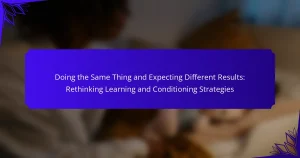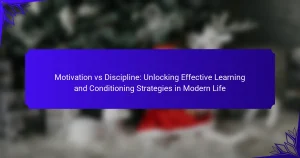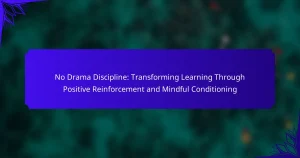Transformative books on learning and modern conditioning can significantly enhance personal development. Key reads like “Mindset” and “Atomic Habits” provide actionable insights for lasting behavioural change. These books explore critical thinking, emotional intelligence, and adaptive learning strategies. Lesser-known titles also challenge mainstream narratives, offering unique perspectives that foster personal growth.
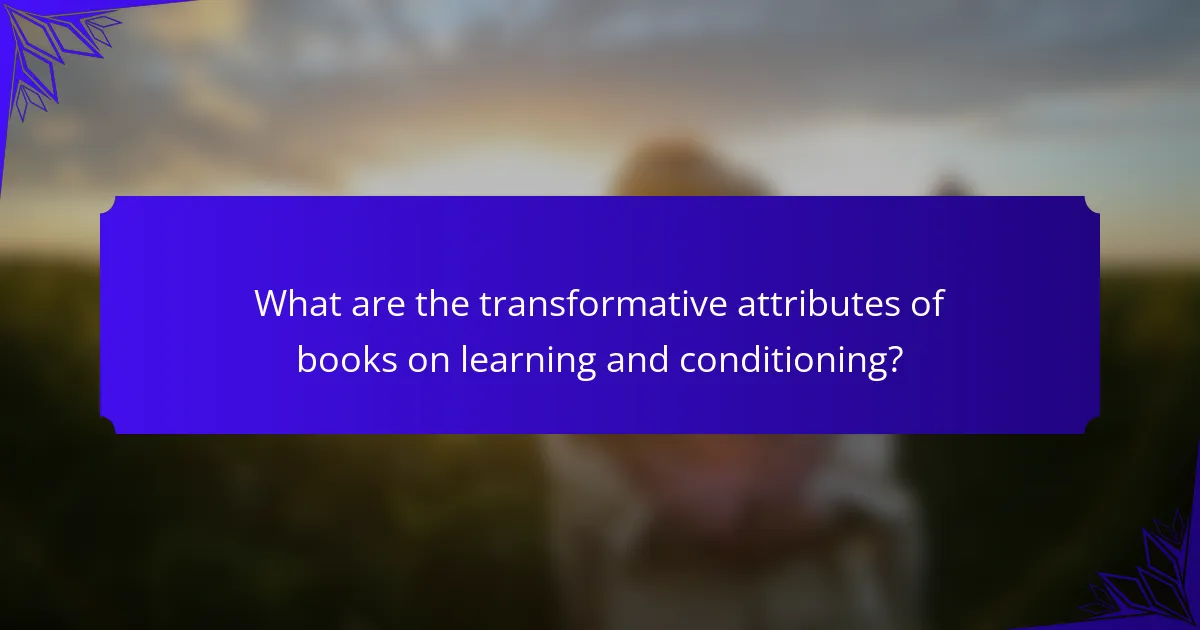
What are the transformative attributes of books on learning and conditioning?
Books on learning and conditioning offer transformative attributes that enhance personal development. They foster critical thinking, improve emotional intelligence, and promote adaptive learning strategies. Notable examples include “Mindset” by Carol Dweck, which emphasizes growth mindset principles, and “Atomic Habits” by James Clear, focusing on incremental change. These books provide actionable insights that can lead to lasting behavioural change, making them essential for anyone seeking to improve their learning processes.
How do these books enhance cognitive development?
Books enhance cognitive development by stimulating critical thinking, improving vocabulary, and fostering empathy. Engaging with transformative reads promotes neural connections, leading to better problem-solving skills. Research indicates that reading increases brain activity, particularly in areas associated with comprehension and analysis. Furthermore, diverse genres expose readers to various perspectives, enriching their understanding of complex concepts. These attributes collectively contribute to a well-rounded cognitive framework.
What are the key principles of effective learning?
Effective learning principles include active engagement, self-regulation, and feedback. These principles foster deeper understanding and retention. Active engagement encourages learners to participate actively, while self-regulation allows for personalized pacing and strategies. Feedback provides essential insights for improvement, enhancing the overall learning experience. These attributes are crucial for transformative learning, as outlined in influential books on the subject.
How do conditioning techniques shape behaviour?
Conditioning techniques significantly influence behaviour by reinforcing desired actions through rewards or consequences. Transformative books on learning and modern conditioning explore these methods, offering insights into behaviour modification. Key concepts include positive reinforcement, which encourages repetition of behaviours, and negative reinforcement, which reduces undesirable actions. Notable titles like “The Power of Habit” by Charles Duhigg and “Mindset” by Carol S. Dweck provide practical applications of these principles, showing how understanding conditioning can lead to personal growth and improved habits. These reads equip individuals with strategies to reshape their behaviours effectively.
What emotional benefits can be gained from reading these transformative books?
Reading transformative books can significantly enhance emotional well-being by fostering self-awareness, empathy, and resilience. These books often provide insights that challenge existing beliefs, leading to personal growth. Engaging with diverse perspectives cultivates empathy, allowing readers to connect with others more deeply. Additionally, the lessons learned from these reads can equip individuals with coping strategies, enhancing their ability to navigate life’s challenges. Overall, the emotional benefits include improved mental health, greater emotional intelligence, and a more fulfilling life experience.

Which books are universally acclaimed for their insights on learning?
Books that are universally acclaimed for their insights on learning include “Mindset” by Carol S. Dweck, “The Art of Learning” by Josh Waitzkin, and “How We Learn” by Benedict Carey. These transformative reads offer profound perspectives on personal development and modern conditioning. “Mindset” explores the power of a growth mindset, while “The Art of Learning” emphasizes mastery through practice. “How We Learn” combines neuroscience with practical insights to enhance learning efficiency.
What are the core themes in these universally popular books?
The core themes in transformative books focus on personal growth, resilience, and the pursuit of knowledge. These themes encourage readers to challenge their beliefs, embrace change, and cultivate a mindset for lifelong learning. Books like “The Power of Habit” explore behavioural change, while “Mindset” emphasizes the importance of a growth mindset. Such works often highlight the interconnectedness of learning and modern conditioning, urging individuals to apply insights practically for meaningful life changes.
How do authors like Carol Dweck influence learning perspectives?
Authors like Carol Dweck significantly influence learning perspectives by promoting growth mindset principles. Dweck’s research emphasizes the belief that abilities can be developed through dedication and hard work, fostering resilience and a love for learning. Her book, “Mindset: The New Psychology of Success,” illustrates how mindset affects achievement across various domains. This transformative approach encourages educators and learners to embrace challenges and view failures as opportunities for growth, reshaping educational practices and personal development strategies.
What role does neuroscience play in these transformative reads?
Neuroscience significantly influences transformative reads by revealing how learning and conditioning reshape our brains. Research indicates that engaging with impactful literature can enhance neural pathways, promoting cognitive flexibility and emotional resilience. Studies show that reading stimulates brain activity, leading to improved empathy and critical thinking skills. This unique attribute of books lies in their ability to facilitate personal growth through neuroplasticity, making them essential for life-changing experiences.
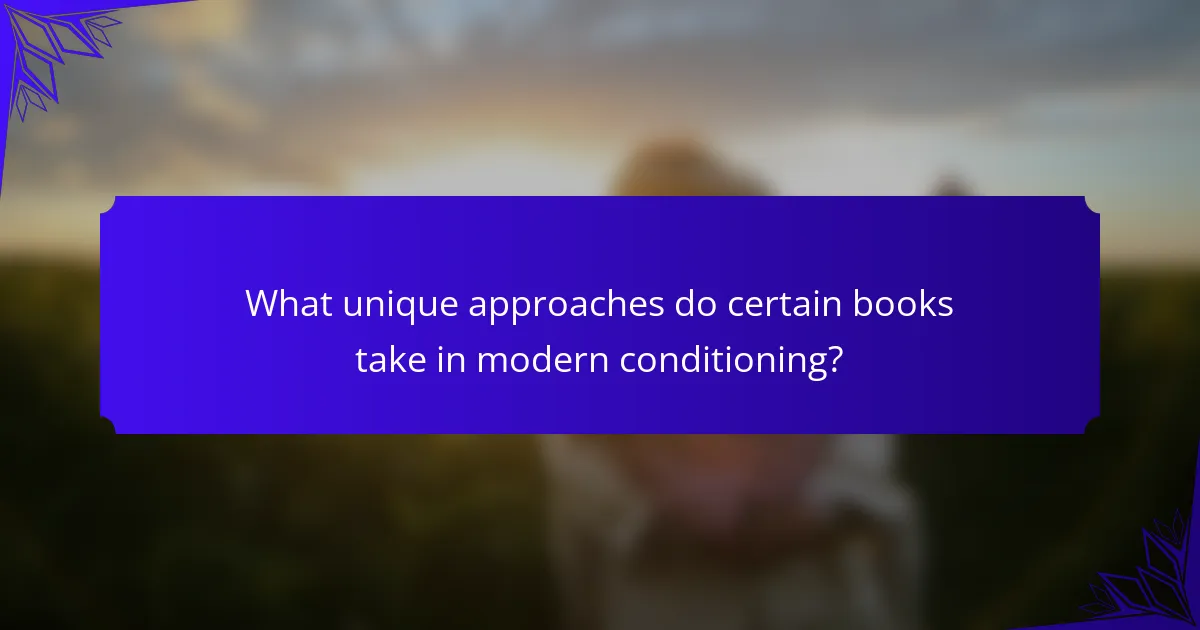
What unique approaches do certain books take in modern conditioning?
Certain books employ unique approaches to modern conditioning by integrating psychological principles with practical applications. For instance, “Atomic Habits” by James Clear emphasizes the power of small, incremental changes to foster lasting behaviour transformation. Another example is “Mindset” by Carol S. Dweck, which introduces the concept of growth mindset, encouraging readers to embrace challenges and learn from failures. These books not only offer theoretical insights but also actionable strategies, making them transformative reads.
How does the concept of growth mindset differ from traditional views?
The growth mindset emphasizes the belief in the ability to develop skills through effort, contrasting with traditional views that see intelligence as fixed. This transformative perspective encourages resilience and adaptability, aligning with modern learning principles. Studies show that adopting a growth mindset can lead to increased motivation and achievement, highlighting its value in personal development.
What innovative techniques do authors like Daniel Kahneman introduce?
Authors like Daniel Kahneman introduce innovative techniques that blend psychology with practical applications. His work emphasizes cognitive biases and decision-making processes, reshaping how we understand human behaviour. Kahneman’s unique attribute is his integration of empirical research into everyday scenarios, facilitating transformative learning experiences. For example, his book “Thinking, Fast and Slow” explores dual-system thinking, providing readers with tools to improve their judgment and decision-making. This approach not only informs but also empowers individuals to recognize their cognitive limitations and enhance their critical thinking skills.

What rare insights can be found in lesser-known transformative books?
Lesser-known transformative books offer unique insights that can profoundly shift perspectives. These works often explore unconventional ideas, challenging mainstream narratives. For instance, “The Art of Learning” by Josh Waitzkin emphasizes the importance of embracing failure as a catalyst for growth. Another example is “The War of Art” by Steven Pressfield, which delves into the psychological barriers that hinder creativity. Such books provide rare attributes like innovative frameworks and personal anecdotes, making them invaluable for those seeking personal development.
How do unconventional authors challenge mainstream learning theories?
Unconventional authors challenge mainstream learning theories by introducing innovative perspectives and methodologies. They often incorporate experiential learning, emphasizing personal narratives and real-world applications. This approach contrasts with traditional theories that prioritize standardized curricula and assessments. For instance, authors like Paulo Freire advocate for critical pedagogy, encouraging learners to question societal norms. Additionally, these authors often highlight the importance of emotional intelligence in learning, which mainstream theories may overlook. By fostering a more holistic understanding of education, unconventional authors inspire transformative learning experiences that resonate with diverse audiences.
What unique case studies are presented in these works?
Books that explore transformative learning often present unique case studies showcasing real-life applications. Notable examples include “Mindset” by Carol Dweck, which illustrates how a growth mindset can lead to personal and professional success through various case studies of individuals overcoming challenges. “Atomic Habits” by James Clear shares compelling narratives about how small, incremental changes can yield significant results, backed by research and personal anecdotes. “The Power of Habit” by Charles Duhigg provides case studies from organisations that successfully implemented habit changes, demonstrating the impact of understanding the habit loop. Each of these works emphasizes practical applications of learning theories, making them impactful for readers seeking transformation.

How can readers apply lessons from these books to real-life situations?
Readers can apply lessons from transformative books by integrating key concepts into daily routines. For instance, books on modern conditioning often emphasize the importance of mindset shifts. These shifts can influence personal habits, decision-making, and relationships.
By practicing the principles outlined in these books, readers can enhance self-awareness and improve emotional resilience. Engaging with exercises or reflections suggested in the texts can lead to actionable insights. As a result, readers may cultivate a proactive approach to challenges, fostering personal growth and improved life satisfaction.
Additionally, discussing these concepts with peers can reinforce understanding and accountability. Sharing insights not only solidifies learning but also encourages collective growth. Overall, applying lessons from these books can lead to meaningful changes in various aspects of life.
What best practices can enhance learning effectiveness?
To enhance learning effectiveness, engage with transformative books that promote active learning and critical thinking. Focus on texts that encourage practical application of concepts, such as “Mindset” by Carol Dweck, which fosters a growth mindset, or “Atomic Habits” by James Clear, which emphasizes incremental change. These books provide actionable strategies that can be integrated into daily learning practices. Additionally, applying techniques like spaced repetition and self-testing, as discussed in “Make It Stick” by Peter C. Brown, can significantly improve retention and understanding.
What common mistakes should readers avoid when implementing these ideas?
Readers should avoid common mistakes such as not applying concepts, neglecting to reflect on their learning, and failing to set actionable goals. Many readers skim through transformative books without internalizing the lessons, which diminishes their impact. Additionally, skipping the practice of regular review can lead to forgetting key insights. Lastly, not engaging with a community for discussion can limit the depth of understanding and application.
How can readers optimize their learning experiences based on these insights?
Readers can optimize their learning experiences by applying insights from transformative books. Focus on active reading techniques, such as note-taking and summarizing key concepts. Engage with the material by discussing it with others or teaching what you’ve learned. Set specific learning goals to track progress and maintain motivation. Additionally, explore various formats like audiobooks or interactive content to enhance understanding. Embrace a growth mindset, viewing challenges as opportunities for development.
